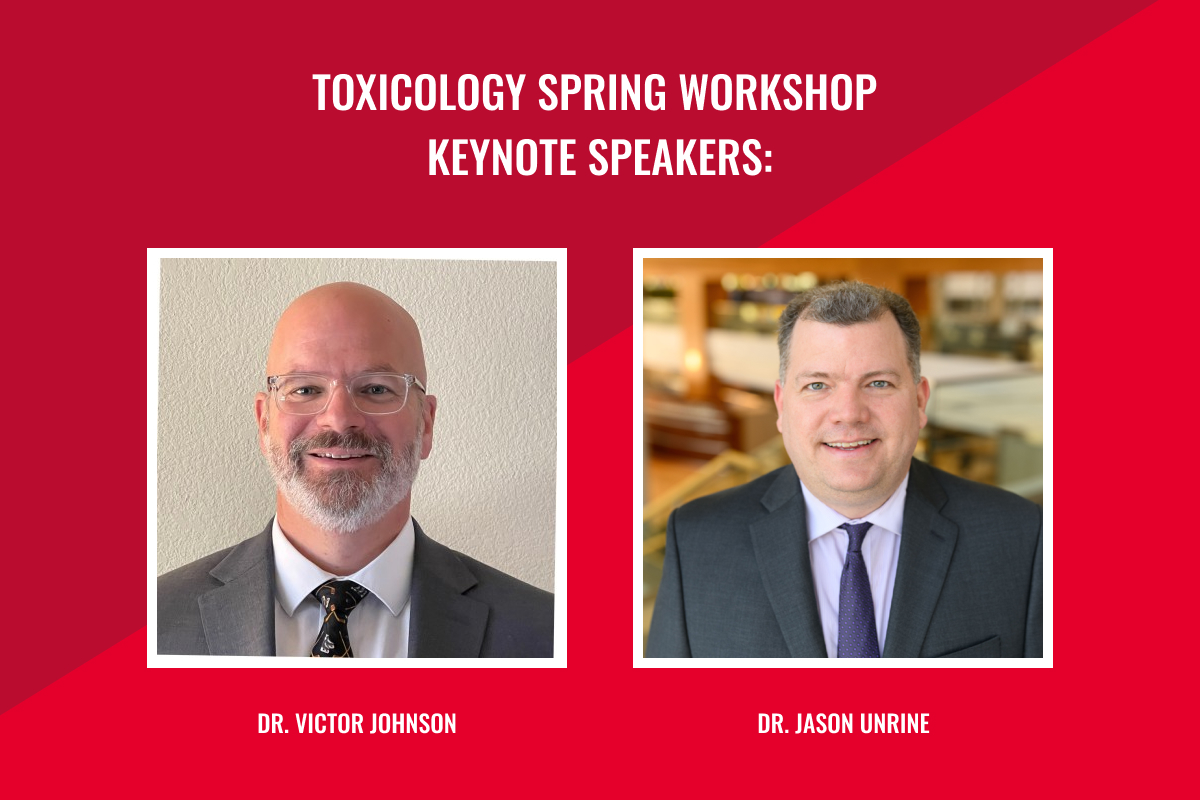Join us for the UGA Toxicology Spring Workshop
When: April 2nd, 2025, 8:30 a.m. – 4:00 p.m.
Where: Paul D. Coverdell Center, Athens, GA
Meet our Keynote Speakers:
Dr. Victor Johnson
Director of Operations at Burleson Research Technologies, Inc. (BRT)
Presenting: “A Toxicologist’s Journey of Opportunities: Always be Prepared to Recognize, Seize, and Create Them.”
About Dr. Johnson:
Dr. Johnson has been an Immunotoxicologist for 27 years and has used a wealth of in vivo and in vitro approaches to address safety concerns for the immune system. He received his PhD in NeuroImmunotoxicology through the Interdisciplinary Toxicology Program from the Department of Physiology and Pharmacology, College of Veterinary Medicine, University of Georgia under the mentorship of Dr. Raghubir Sharma. He studied the detrimental effects of aluminum exposure on the immune system in the brain. During his tenure at the ITP under the expert guidance of Dr. Sharma, Dr. Johnson was fortunate to be part of many team projects resulting in the publication of 23 immunotoxicity research papers. From UGA, he joined NIOSH in 2002, and became Team Leader in the Immunotoxicology Laboratory in 2006, where he lead a program investigating the mechanisms and genetics of occupational asthma and rhinitis using animal models and human subjects. Dr. Johnson’s research program at NIOSH developed murine models of chemical-induced occupational respiratory allergies and he is a co-inventor of novel technologies to assess airway function in rodents and monoclonal antibodies specific for chemical asthmogens.
Currently, Dr. Johnson is the Director of Operations at Burleson Research Technologies, Inc. (BRT) and since joining BRT in 2011, he has developed and validated several immunoassays for detection of novel biotherapeutics for PK assessment as well as immunogenicity assays to detect host immune responses to drug treatment. He has experience developing in vivo models for immunotoxicity assessment including isocyanate-induced allergic rhinitis, pulmonary MRSA host resistance, and chemical-induced irritable bowel disease, to name a few.
Most recently, he is leading the development of a comprehensive in vitro toolbox using human whole blood as a screening tool for immunotoxicity assessment. Much of this work was performed under the NIEHS Immunotoxicology Contract awarded to BRT in 2014, of which Dr. Johnson serves as the Principal Investigator. He has been a member of the International Working Group focused on developing Alternatives to in vivo Developmental Immunotoxicity Testing (DIT) which was formed in 2019. He has published 76 papers and 18 book chapters in Immunotoxicology. Dr. Johnson has been a member of the Society of Toxicology and Immunotoxicology Specialty Section thereof since 1998 and received the Outstanding Young Immunotoxicologist Award in 2011 and the Outstanding Senior Immunotoxicologist Award in 2023. He served as President of the Immunotoxicology Specialty Section in 2017-2018.
Dr. Jason Unrine
Professor, University Research Professor in the Department of Plant and Soil Sciences in the Martin-Gatton College of Agriculture, Food, and Environment at the University of Kentucky
Presenting: “From the bench to the real world: why an interdisciplinary approach is needed to tackle toxicology’s toughest challenges.”
About Dr. Unrine:
Jason Unrine is Professor and University Research Professor in the Department of Plant and Soil Sciences in the Martin-Gatton College of Agriculture, Food, and Environment at the University of Kentucky, Director of the analytical core of the UK Center for Appalachian Research in Environmental Sciences, Member of UKs Markey Cancer Center, and Director of the Kentucky Water Research Institute. He graduated from the University of Georgia Interdisciplinary Toxicology Program in 2004 where he conducted his research on effects of dietary mercury exposure on amphibian development at the Savannah River Ecology Laboratory.
For over 20 years, he has continued his research on the environmental chemistry and toxicology of emerging and legacy contaminants including engineered nanomaterials, trace-elements, and drinking water disinfection byproducts. He also teaches courses on environmental analytical chemistry, ecotoxicology, and global change.
